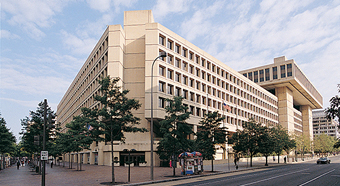
Image courtesy of Federal Bureau of Investigation
Trump May Have Asked Comey to Prosecute Reporters
| published May 17, 2017 |
By Thursday Review staff writers
According to a report in the New York Times this week, President Donald Trump asked then-FBI Director James Comey—recently fired by the President—to consider prosecuting and putting journalists in jail for revealing information gathered from leaks. The conversations regarding leaks to reporters took place sometime in February, according to what the New York Times reported.
Trump was, at the time, worried about classified and sensitive information being leaked to the media from official sources, including the FBI, the Pentagon, several major departments, and even the White House. Trump reportedly requested that Comey explore ways to jail certain reporters or publishers for printing, broadcasting or disseminating such information.
Comey may have, however, demurred on the matter, and according to some sources may have gently reminded the President of the 1971 Supreme Court ruling which affirmed the First Amendment right of a free press, with the caveat that no journalist, editor or publisher invite or encourage the leaker to break the law or violate specific government rules on information or data.
According to the Times reports, Comey sensed that Trump’s major concern was not so much classified information from various agencies reaching the ears or eyes of reporters; but the President was deeply frustrated with information from within the White House, often in the form of negative narrative. The Trump administration has experienced numerous public relations setbacks and pratfalls over the last months, many of the incidents the result of perceived disorganization within top White House staff.
Trump fired Comey earlier this month in a move which shocked member of Congress of both parties. Though Comey has remained silent on the matter, some of his former FBI colleagues have spoken out, suggesting that the White House is attempting to spin a false narrative of Comey as ineffective and incompetent. Though his dismissal came after the White House said that top Justice Department officials recommended Comey’s firing, Trump later said he had intended to fire Comey all along.
The Trump-Comey dustup has stirred unease among many Republicans worried that the President is attempting to blunt or minimize any further investigation inro possible collusion between top Trump campaign officials and surrogates, and Moscow. Comey’s firing has also spurred Democrats in Congress to call for a fuller investigation into the matter, including the release—if they exist—of audio recordings of conversations between the President and Comey. To burnish his position on his decision to fire Comey, Trump has said he has recordings on several key conversations between himself and the FBI Director.
Acting FBI Director Andrew McCabe told Congress that there has been no official instruction to turn off investigations into the alleged Russia-Trump links or into whether Moscow meddled in U.S. elections last November. But the President has repeatedly said that the story is false and “fake news,” and has called the probe a waste of taxpayer money.
On Wednesday, the Justice Department announced that it was appointing a special counsel to take the primary reins of the Russia-Trump investigations. Deputy Attorney General Rod Rosenstein selected former FBI chief Robert Mueller to helm the probe into whether Russia used influence or hacking to skew the outcome of the U.S. presidential elections in 2016, and whether top officials of the Trump campaign colluded with the Kremlin prior to—or immediately after—November 2016.
Mueller, who was one of the longest serving FBI directors and second only to J. Edgar Hoover in length of service as chief, will head the team of FBI agents, Justice Department investigators, U.S. Treasury agents, and prosecutors now engaged in the Russia-Trump investigation, a probe which may soon expand into charges that Trump fired Comey in order to derail or blunt the FBI’s progress on the case.
The probes are also looking into how, and under what circumstances, Russians may have hacked into servers and email accounts of Democratic officials.
Related Thursday Review articles:
Comey's Firing Pleases few in Washington; R. Alan Clanton; Thursday Review; May 13, 2017.
Comey Dismissal Sparks Outrage in Congress; Thursday Review editors and staff; Thursday Review; May 10, 2017.
